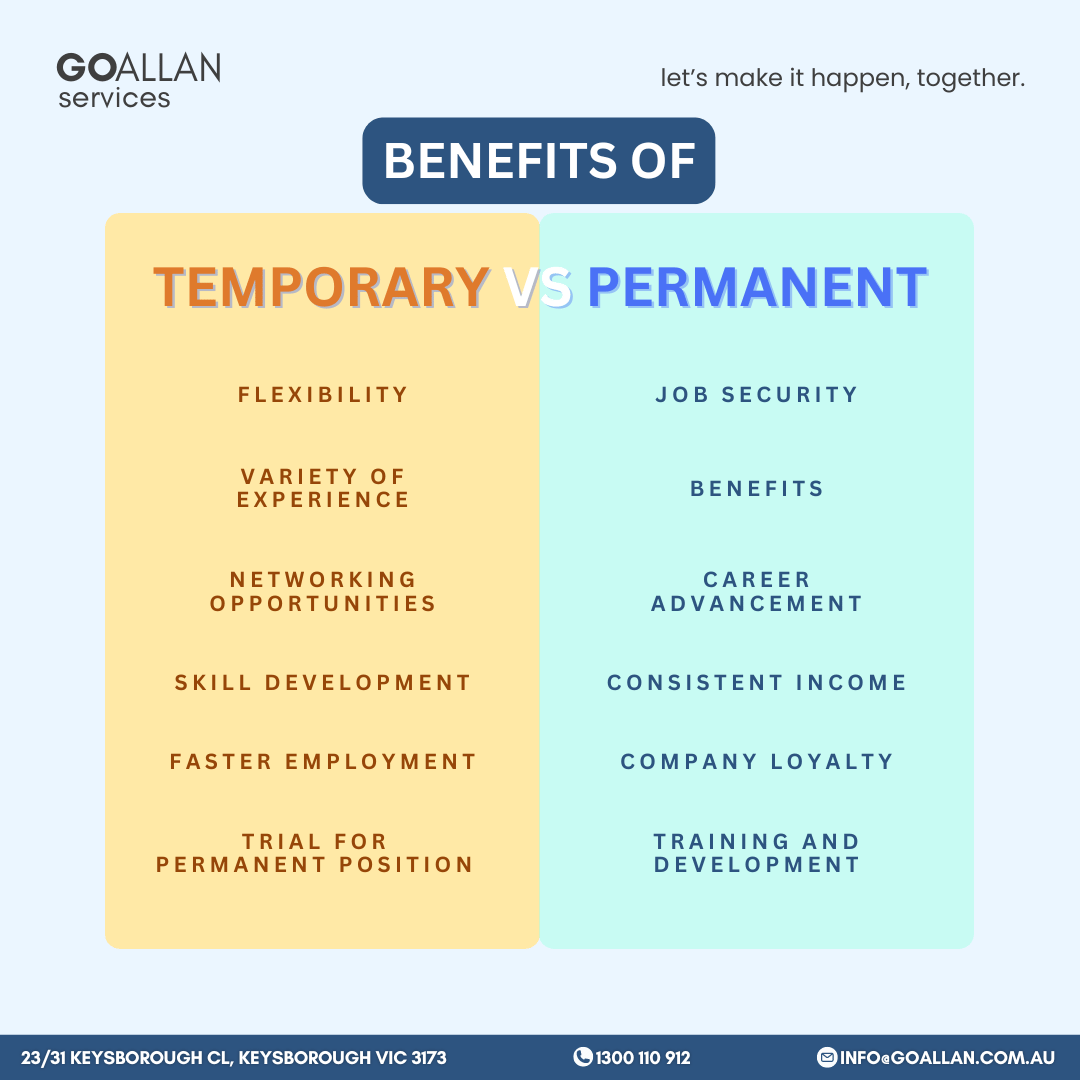Temporary vs Permanent Roles

Temporary vs Permanent Roles (09/09/2024)
Published: 03/09/2024 11:10 am
Choosing between temporary and permanent roles can be a significant decision in your career journey. Each type of employment offers unique advantages that can align with different career goals, lifestyles, and personal preferences. Here’s a detailed look at the benefits of both temporary and permanent roles to help you make an informed choice.
Benefits of Temporary Roles
Flexibility:
Temporary roles are known for offering greater flexibility in work hours and schedules. This can be especially beneficial for individuals who need to balance work with other commitments, such as family, studies, or personal projects. With flexible hours, you can manage your time more effectively and create a work-life balance that suits your needs.
Variety of Experience:
Working in temporary roles allows you to gain experience across different industries, companies, and job functions. This diversity can be invaluable, as it not only broadens your understanding of various fields but also makes your resume more attractive to future employers. The range of experiences can help you identify what you enjoy most and where your strengths lie.
Networking Opportunities:
Temporary positions often place you in different work environments, giving you the chance to meet a wide range of professionals. Building a broad network through these varied roles can open doors to new opportunities, provide valuable industry insights, and even lead to mentorship or future job offers.
Skill Development:
Temporary roles provide a platform for rapid skill development. As you take on new challenges and responsibilities in different settings, you can quickly learn and improve both hard and soft skills. This can be particularly advantageous for those early in their career or looking to transition into a new field, as it allows you to build a diverse skill set in a short period.
Fast Employment:
The hiring process for temporary roles is usually quicker compared to permanent positions. This can be ideal if you are looking to start work immediately or need a job between other commitments. Fast employment also helps fill gaps in your resume, showing continuous work experience to future employers.
Trial for Permanent Position:
Many temporary roles have the potential to turn into permanent positions. Employers often use temporary hires as a way to evaluate a candidate’s fit within the company. If you perform well, it could lead to a long-term offer, giving you the chance to secure a permanent role with a company you’ve already experienced working for.
Benefits of Permanent Roles
Job Security:
One of the primary benefits of a permanent role is job security. Knowing that you have a stable job provides peace of mind and allows you to plan for the future. Permanent roles typically offer long-term employment, reducing the uncertainty that can come with temporary positions.
Benefits:
Permanent employees usually have access to a range of benefits that may include health insurance, retirement plans, paid time off, and other perks. These benefits contribute significantly to overall job satisfaction and can provide financial and health security for you and your family.
Career Advancement:
Permanent roles often offer more opportunities for career advancement. Working in a long-term position allows you to grow within the company, take on more responsibilities, and potentially move up the career ladder. Companies are more likely to invest in the development and promotion of permanent employees.
Consistent Income:
A permanent position provides a steady paycheck, making it easier to manage your finances and plan for expenses. This consistency can be especially important for those with financial obligations such as mortgages, loans, or dependents.
Company Loyalty:
Staying with one company long-term allows you to build strong relationships and a sense of loyalty within the organisation. This can lead to a more fulfilling work experience, as you become an integral part of the company’s culture and success.
Training and Development:
Permanent employees often have access to training programs and resources to enhance their skills. Employers are more likely to invest in the professional development of permanent staff, providing opportunities to learn, grow, and advance within the company.
Both temporary and permanent roles offer distinct advantages depending on your career goals and personal circumstances. Ultimately, the choice between temporary and permanent roles depends on what aligns best with your personal and professional goals. Consider what matters most to you at this stage of your career to make the most informed decision